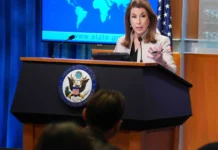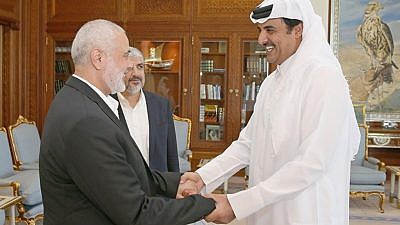Since May 2017, Qatar has been waging a multifront battle with the Arab quartet. The camps are clear-cut: In Qatar’s corner are Hamas, the Muslim Brotherhood, Turkey and Iran. In the other corner are Saudi Arabia, Egypt, the United Arab Emirates and Bahrain. Israel has an interest in strengthening relations with the latter four, as allies against Iran.
For many years now, Qatar has been pushing an anti-Semitic agenda, be it in its policies or by way of the Al Jazeera network it operates. The Persian Gulf state openly supports Hamas and the Muslim Brotherhood, and encourages terrorism against Israel. The Al Jazeera network has always been, and still very much is, a mouthpiece for Al-Qaeda and its various affiliates.
For years, Qatar has provided safe haven to Sheikh Yousuf Al-Qaradhawi, the Muslim Brotherhood’s religious authority. Qaradhawi has called for a second holocaust against the Jews, this time “with the help of Allah and by the faithful [Muslims].”
Today, Qatar maintains an active military alliance with Turkey, where terrorist plots against Israel are increasingly hatched and whose hostility towards Israel is rapidly growing. More recently, the lid was blown off Qatar’s covert collaboration with Iran.
Qatar also helped rehabilitate southern Lebanon after Hezbollah’s war with Israel in 2006, thereby strengthening Hezbollah’s position in any future clash with Israel. It did the same for Hamas in Gaza after the 2014 war.
Under these circumstances, it’s only natural that Israel would view Qatar as the enemy it is and refuse to allow Qatar to exert its influence over Gaza, where such influence could severely hurt Israel in a future clash. However, what would seem natural to anyone who cares about Israel’s security, is apparently not so obvious to the Israeli government, as evidenced by the fact that the government is allowing Qatar to shore up Hamas’ power among the Palestinian public.
Israel is allowing Muhammad al-Emadi, a Qatari agent with the title of ambassador, to visit Israel at will (by his own account, he has visited Israel 20 times since 2014), and he frequently enters Gaza and hands out Qatari aid. He gives interviews in Israeli media outlets, where he purports to explain Israel’s interests to the Israelis. All this while Gaza is under the grip of Hamas, and every cent of aid that is transferred there, even if it is not meant for military purposes, only strengthens Hamas.
So how does the Israeli government explain this incomprehensible policy of collaboration with an enemy state? At the top of the list of excuses is the (clearly unfounded) claim that the Qatari aid to Gaza is preventing a war by keeping Gaza from plunging into a humanitarian crisis. This claim should be examined on two levels: First, is there really a humanitarian crisis in Gaza? Objective evidence suggests that the threat of humanitarian crisis is largely a media manipulation orchestrated by Qatar on one side and the Israeli government on the other. Second, even if this claim were true, the question remains: Is Qatari aid the only way to prevent this humanitarian crisis that will supposedly lead to war? And isn’t Israel capable of preventing such a crisis on its own, without requiring the services or money of Qatar? For example, couldn’t Israel simply provide a supply of electricity, which appears to be the source of all the infrastructure challenges?
The truth is that these problems could be solved within a reasonable time frame if Israel were to provide the necessary electricity to power the waste purification and water-desalination projects that have already been built, and if Hamas were to permit the use of Israeli electricity for the benefit of Gaza’s residents. If we go by the argument that the humanitarian crisis poses a threat of war, which could exact a high Israeli death toll, isn’t it worth it for Israel to make the investment in electricity to avoid paying a price in soldiers’ lives, even if doing so may appear as a surrender to extortion?
In any case, Israel can demand its investment back, with interest, in a myriad of ways.
Furthermore, if Hamas refuses to let Israel help resolve this infrastructure problems of Gaza, Israel will be absolved of responsibility for this situation. Under such circumstances, if a war erupts as a result of a humanitarian collapse, it will be because Hamas forced its will on the residents of Gaza—and it will be obvious to everyone who is to blame.
In recent weeks, false claims and unfounded projections have been widely made, mainly by Israelis, regarding a humanitarian crisis, a shortage of food and imminent war in Gaza. But these claims run contrary to data of the Israeli government itself, as well as reports on Al Jazeera and in the Hamas mouthpiece in Gaza Al-Risalah. Here are just a few examples of evidence to the contrary:
According to the Defense Ministry’s Land Crossings Authority, which operates the Gaza border crossings, some 160,000 trucks carrying goods purchased by Gaza residents crossed into Gaza from Israel in 2017. According to the IDF Coordinator of Government Activities in the Territories, some 100,000 housing units are currently being built and hundreds of other projects are also underway.
Al Jazeera recently broadcast an exposé, available on the Middle East Media Research Institute website, about the economic boom in Gaza, which includes new, modern shopping malls, 24 hotels, gourmet restaurants and more. Two weeks ago, the Hamas website dedicated a video feature not to the humanitarian crisis that the Israeli government has been warning about, but to the phenomenon of cars being stolen from Israel and brought to Gaza.
Another argument that has been made is that the sides could easily be dragged into a war that they did not intend to wage and that Qatari mediation is the only way to prevent such an undesirable scenario. This, too, is a baseless argument, because Israeli prisons are full of Hamas prisoners who could fulfill that role just as well if Hamas is truly interested in preventing the situation from deteriorating. There is no need specifically for a Qatari envoy or officer.
Let’s take another look at the regional perspective: The Arab quartet, which Israel needs to combat Iran, is furious at Israel’s double game. This was relayed to me by American sources close to these four states. The Israeli government is deluding itself if it thinks that it can play such a double game without its actions coming back to bite Israel. This will likely undermine Israel’s relations with the quartet at a critical time.
The worst part about all this is that Israeli policy that allows Qatar to bolster Hamas will end up exacting a heavy toll from Israel in a future confrontation. The day is not far off when people start to ask why Israel enacted a policy that strengthened its enemies. Was it a conscious government decision that considered these diplomatic and military consequences? Or was the government inadvertently led by unworthy considerations into a policy of self-harm and collaboration with an enemy?
Yigal Carmon is president of the Middle East Media Research Institute.
This article appeared in the March 4 edition of Israel Hayom.


























